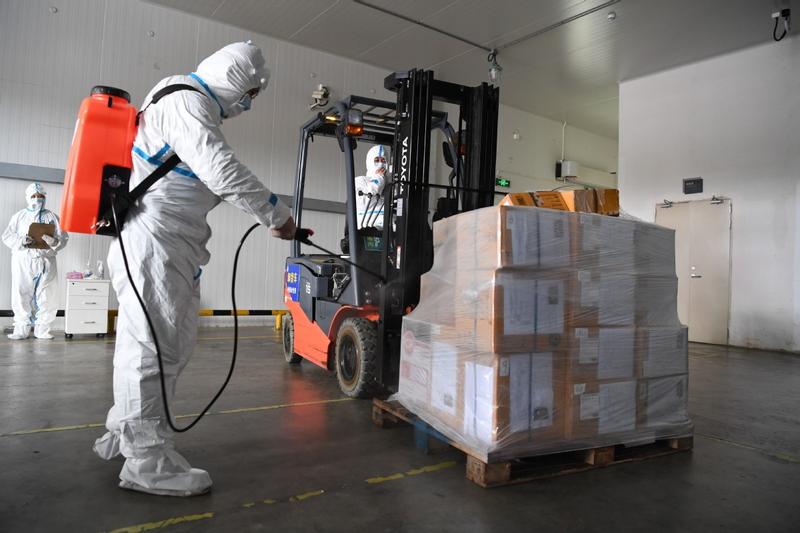 A worker disinfects packaged cold-chain food to be exhibited at the third China International Import Expo in Shanghai on Oct 29, 2020. (PHOTO PROVIDED TO CHINA DAILY)
A worker disinfects packaged cold-chain food to be exhibited at the third China International Import Expo in Shanghai on Oct 29, 2020. (PHOTO PROVIDED TO CHINA DAILY)
Shanghai Pudong International Airport, which is linked to all of the city's six local COVID-19 cases reported from Friday to Monday, said that none involved passenger transport areas.
"The airport is operating in order and safely with a string of measures of epidemic prevention in place," Zhou Junlong, vice-president of Shanghai Airport Authority, said at a news conference on Monday.
Four workers at a cargo station at the airport and two of their wives had tested positive for the virus since Friday.
More than 17,000 cargo workers at Pudong airport were tested for COVID-19, and according to the Shanghai Health Commission, one of the test results came back positive
Throughout Sunday night, the city completed nucleic acid tests for all of its more than 17,000 cargo workers at Pudong airport. The Shanghai Health Commission said one of the test results came back positive.
ALSO READ: Pudong airport cargo staff tested as Shanghai sees 2 local cases
"New measures, including for imported cold-chain products arriving at the airport, will be employed at designated areas, and there will be centralized accommodation for related workers. This has been done to minimize the risk of the virus' spread," Zhou said.
Zhou also said that regular nucleic acid tests will be arranged for front-line cargo workers at high risk of being exposed to the novel coronavirus in winter. "Emergency vaccination for COVID-19 will be prioritized for these workers, with their consent," he said.
Meanwhile, strict cargo disinfection, standard loading and unloading procedures, and staff protection will be beefed up throughout cargo dispatch and transportation at the airport, he said.
Epidemiologists have warned that imported non-cold-chain cargo may become a virus transmission vector in winter as the environment for international freight this season is similar to the cold chain in summer, allowing the virus to survive longer on the surface of containers and product packaging.
READ MORE: Cross-border cold chains among key concerns in anti-virus efforts
Li Guohua, vice-governor of Shanghai's Pudong district, said that all the nucleic acid tests for the close contacts and related individuals to the two confirmed cases reported on Sunday, as well as the relevant environment, were negative. Epidemiological investigations are still ongoing.
Sun Xiaodong, deputy director of the Shanghai Center for Disease Control and Prevention, said that epidemiological investigations showed that the cases on Nov 9 and 10 came from two workers at Shanghai Pudong International Airport who both entered an aircraft container from North America on Oct 30.
"The genes of the two cases are highly homologous and highly similar to the strain spread in North America, which suggested that the source of infection was imported from abroad," he said, adding that the two workers had not come into contact with any cold-chain logistics within 14 days before they got infected.
In Tianjin's Binhai New Area, large-scale nucleic acid testing since Saturday had basically been completed by 3 pm Monday after the report of multiple local infections this month. All the 2.33 million test results obtained were negative. A new confirmed COVID-19 case, who was symptomatic, was reported in the city on Monday.
Nucleic acid tests for residents of Manzhouli, in the Inner Mongolia autonomous region, started on Sunday after two local cases. The city aims to complete citywide tests within three days.
Yang Cheng in Tianjin and Yuan Hui in Hohhot contributed to this story.


